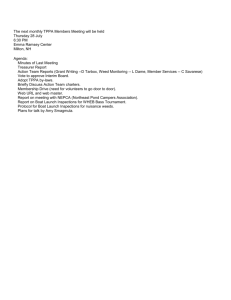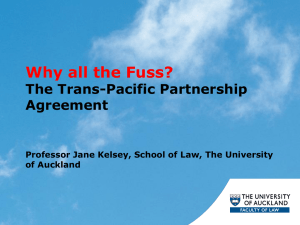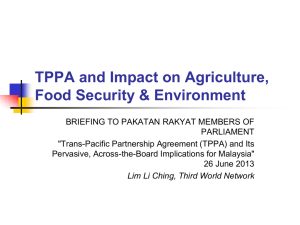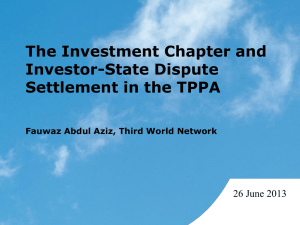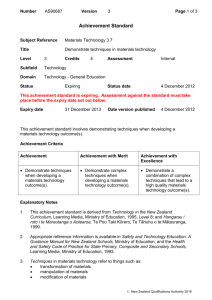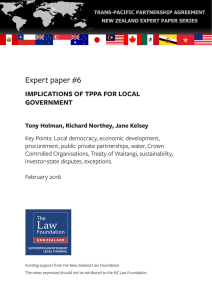Read a three page analysis document here.
advertisement
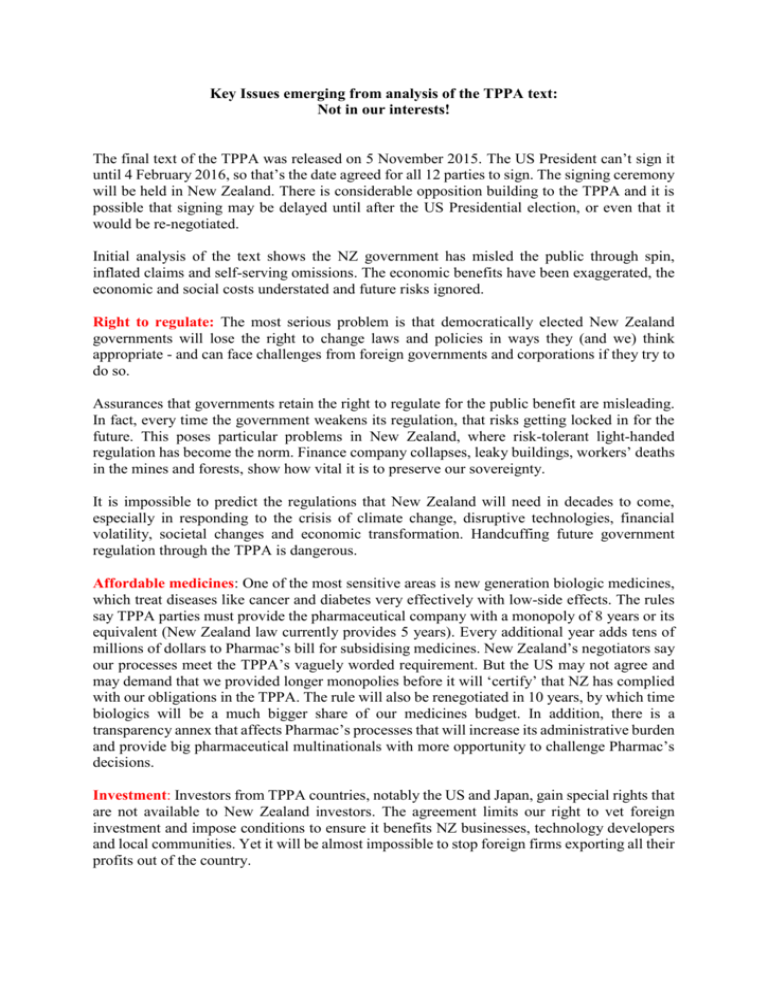
Key Issues emerging from analysis of the TPPA text: Not in our interests! The final text of the TPPA was released on 5 November 2015. The US President can’t sign it until 4 February 2016, so that’s the date agreed for all 12 parties to sign. The signing ceremony will be held in New Zealand. There is considerable opposition building to the TPPA and it is possible that signing may be delayed until after the US Presidential election, or even that it would be re-negotiated. Initial analysis of the text shows the NZ government has misled the public through spin, inflated claims and self-serving omissions. The economic benefits have been exaggerated, the economic and social costs understated and future risks ignored. Right to regulate: The most serious problem is that democratically elected New Zealand governments will lose the right to change laws and policies in ways they (and we) think appropriate - and can face challenges from foreign governments and corporations if they try to do so. Assurances that governments retain the right to regulate for the public benefit are misleading. In fact, every time the government weakens its regulation, that risks getting locked in for the future. This poses particular problems in New Zealand, where risk-tolerant light-handed regulation has become the norm. Finance company collapses, leaky buildings, workers’ deaths in the mines and forests, show how vital it is to preserve our sovereignty. It is impossible to predict the regulations that New Zealand will need in decades to come, especially in responding to the crisis of climate change, disruptive technologies, financial volatility, societal changes and economic transformation. Handcuffing future government regulation through the TPPA is dangerous. Affordable medicines: One of the most sensitive areas is new generation biologic medicines, which treat diseases like cancer and diabetes very effectively with low-side effects. The rules say TPPA parties must provide the pharmaceutical company with a monopoly of 8 years or its equivalent (New Zealand law currently provides 5 years). Every additional year adds tens of millions of dollars to Pharmac’s bill for subsidising medicines. New Zealand’s negotiators say our processes meet the TPPA’s vaguely worded requirement. But the US may not agree and may demand that we provided longer monopolies before it will ‘certify’ that NZ has complied with our obligations in the TPPA. The rule will also be renegotiated in 10 years, by which time biologics will be a much bigger share of our medicines budget. In addition, there is a transparency annex that affects Pharmac’s processes that will increase its administrative burden and provide big pharmaceutical multinationals with more opportunity to challenge Pharmac’s decisions. Investment: Investors from TPPA countries, notably the US and Japan, gain special rights that are not available to New Zealand investors. The agreement limits our right to vet foreign investment and impose conditions to ensure it benefits NZ businesses, technology developers and local communities. Yet it will be almost impossible to stop foreign firms exporting all their profits out of the country. Investor enforcement: Foreign investors can enforce these special rights in controversial offshore tribunals, not in our domestic courts. Investor-state dispute settlement (ISDS) provisions in other agreements have been widely used (especially by US investors) to challenge new regulations that adversely affect their business. The TPPA would allow foreign multinationals to challenge a huge range of decisions in future, such as regulation that adversely affected a contract for oil exploration, a PPP contract for water, sewage or toll roads, a mining or forestry concession with central government or with an SOE exercising a delegated power. The government says the TPPA has addressed the problems with ISDS, but it has tinkered at the edges. Most arbitrators are still likely to come from a small club of investment lawyers, with no effective conflict of interest rules (although some are promised). There is no guarantee they will apply consistent rules and no way to appeal if they make rogue decisions. There’s no cap on damages or compound interest. Health and environment protections: There is a general exception provision that appears to protect public health or environment measures. But it is weak and has rarely succeeded when governments have relied on it in disputes. It does not even apply to the investment chapter. Instead, there are various provisions that refer to ‘legitimate public policy’ objectives, but they only apply to some rules or their wording is full of hidden traps. Some so-called protections for environment, health and regulatory objectives just allow the government to do what the chapter allows the government to do anyway. In places, there is less protection than agreements that NZ has with other countries, like China, South Korea and Taiwan – and they will now get the benefit of the TPPA’s pro-investor rules. Tobacco: Malaysia had wanted to carve tobacco control measures out from the entire agreement, but failed to get support. There is a special exception for tobacco, but it applies only to disputes brought by foreign investors under the investment chapter, and a country must opt in if it wants to use it. TPPA governments can still State to State dispute settlement to challenge tobacco control measures under the investment chapter, as well as labelling rules and intellectual property rights under other chapters – similar to those that Australia’s plain packaging law faces in the WTO. Services: Most existing regulation of various services and investments will be locked in so governments can’t make them more restrictive in the future, including problem areas like construction and services related to forestry. Market models of services like education and broadcasting will have to remain the norm, with governments required to choose the most light handed approach to regulation, including zoning and quality standards. Finance: Many of the risk-tolerant rules on financial services that have allowed banks to become too big to fail and fostered shadow banking systems offshore will have to remain, or be weakened. Governments have limited room to move in a financial crisis, including imposing controls on movement of capital into and out of NZ, and major problems taking steps that would prevent a crisis if they contravene the TPPA’s rules. The Agreement also allows financial services companies to use ISDS to sue governments for allegedly breaching their special protections. State-owned enterprises: State-owned Enterprises are required to operate on a fully commercial basis and not receive advantages that other countries say are unfair, unless the government has protected them from the rules (NZ has listed few protections). It will be really hard to create new SOEs that require support or guarantees – such as proposals for a new stateowned insurance company. Information, innovation, internet and privacy: Stronger protection for intellectual property rights primarily benefits IP holders (who are mainly in the US). Copyright is extended by 20 years in two tranches, incurring significant direct costs for the New Zealand economy and inhibiting innovation and creative expression. There are potential problems with data privacy in the e-commerce chapter, as information can be held in offshore countries with weak privacy protections and strong surveillance powers. A new offence for removing digital locks on content, even where there is no copyright infringement, could criminalise members of the public for legitimate activities or tinkering with technology. Creating and protecting jobs: Approval of foreign purchases of New Zealand assets or other foreign investment can’t be linked to creating jobs. The government procurement chapter aims to prevent governments from using government purchasing power to foster local businesses and jobs. There is a built-in review after 3 years to extend these obligations to regional and local government. The SOE chapter requires SOEs to use only commercial considerations when buying and selling goods and services. New Zealand business is further disadvantaged by allowing foreign investors to challenge laws through ISDS. Protecting the environment: The government has suggested that one of the areas of gains in the TPPA is in environmental protection, but the useful measures on curbing fisheries subsidies and trade in endangered species are far outweighed by the provisions that undermine environmental laws. These include threats to NZ’s restrictions on product labelling for GM content, sugar content and food safety; threats to regulation of mining, fracking and pollution from ISDS challenges; and threats to action on climate change – the TPPA fails to even make a mention of climate change anywhere in its 6147 pages. Instead, proposed references to climate change and the UNFCCC in the environment chapter have disappeared. They now refer to a low emissions economy. The economy: The TPPA has been sold primarily on the basis of its economic benefits to exporters. But the tariff reductions are small and don’t necessarily mean additional trade. Even the most obvious costs have been excluded from the modelling. Analysis of the agreement has revealed significant additional costs and serious risks to affordable health care, innovation and creativity, privacy, the environment and government’s right to regulate. The TPPA has been touted as a “21st Century agreement”. It is far from it. Rather, it looks more like a desperate attempt to lock in the failed pro-corporate policies of the last century. The preliminary analysis indicates that it would not be in our interests for New Zealand to sign this agreement. Full analysis of the different chapters will follow, with expert peer reviewed papers being released over the next two weeks.
